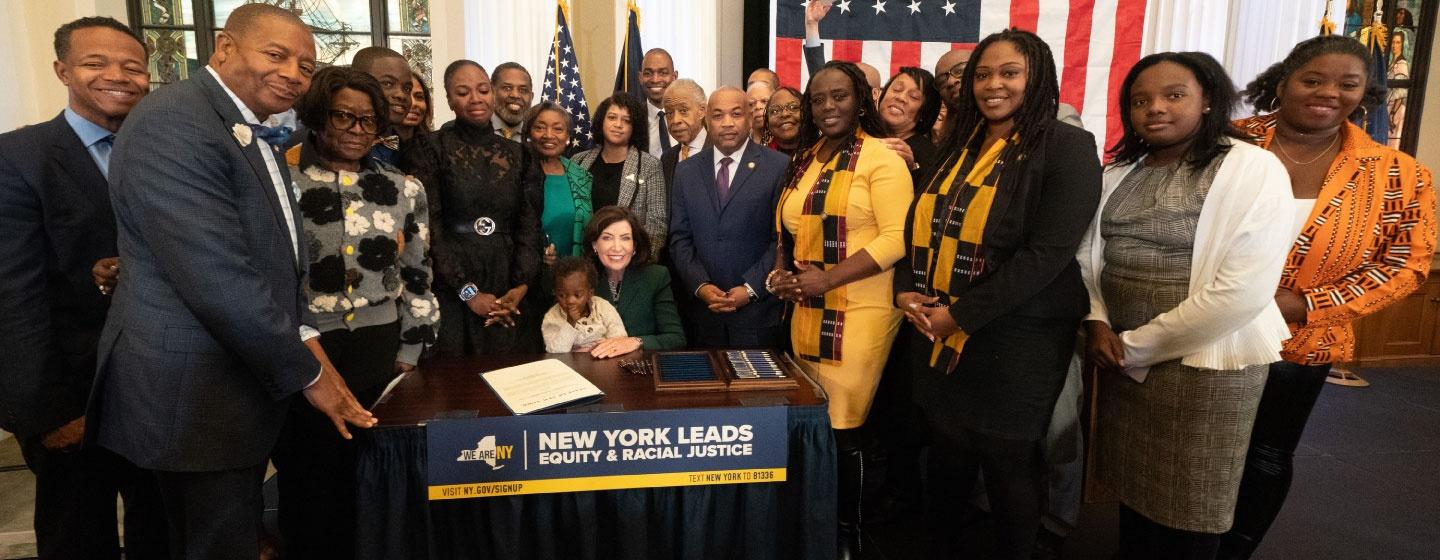Hochul Signs Bill To Create Reparations Commission

Hochul Signs Bill To Create Reparations Commission
Gov. Kathy Hochul on Tuesday signed into law a measure to look at potential reparations for New Yorkers whose ancestors suffered under slavery in the state.
The new law establishes a task force to study the impact of slavery on present-day New Yorkers, consider the possibilities of paying monetary reparations and changing housing policies, and reforming a criminal justice system that disproportionately imprisons Black and brown people.
“By signing this bill today, I'm authorizing the creation of a commission,” Hochul said. “A committee to study what reparations might look like in New York.”
Hochul said New York often pats itself on the back for being the center of the abolitionist movement in the 1800s, with famous residents including Frederick Douglass, Harriet Tubman and Sojourner Truth, and a robust underground railroad.
But New York’s history also has a darker side, she said. Before slavery was abolished in the state in 1827, enslaved Africans made up 20% of New York City’s population, and 40% of colonial households owned slaves. A slave market existed on Wall Street for 100 years.
“Here in New York, there was a slave market where people bought and sold other human beings with callous disregard,” Hochul said. “It happened right on Wall Street for more than a century.”
Even after the North won the Civil War, redlining in white neighborhoods and other forms of segregation kept Black and brown New Yorkers from getting ahead economically.
Speakers at the announcement included the first African American female leader of the state Senate, Andrea Stewart-Cousins, the Black New York State Assembly Speaker, Carl Heastie, and the Rev. Al Sharpton.
Sharpton credited Hochul for her courage in creating the commission, saying it’s long overdue.
“Where you go and cut deals on Wall Street, our forefathers were put on blocks and sold like soap,” the civil rights leader said.
The governor admitted that the idea of reparations for slavery, which ended in the U.S. over 150 years ago, is controversial, and she said she struggled with the notion. But she said descendants of people who were enslaved need more than just an apology.
Hochul said the 2022 mass shooting in her hometown of Buffalo, where a white gunman targeted and killed Black shoppers, demonstrated there’s more to be done.
“I don't want to pretend I didn't have some concerns about this,” Hochul said. “Anyone thinks that racism and hatred toward Blacks no longer exists, tell that to the families of the 10 victims in the grocery store in Tops at the massacre in Buffalo, who once again will be staring at empty chairs over their Christmas dinner.”
The state of California has created a similar commission. That panel recommended that thousands of dollars be paid to each descendant of enslaved people to make up for disparities in health care, access to housing, and mass incarceration and policing policies that disproportionately affected people of color.
New York’s commission will be required to issue its report one year after its first meeting, which should happen sometime in 2024.
In a statement, Republican state Senate Minority Leader Robert Ortt called the commission “divisive” and “unworkable.”
“The reparations of slavery were paid with the blood and lives of hundreds of thousands of Americans who fought to end slavery during the Civil War,” he said.
Related

AI in Education
With the launch of ChatGPT and other generative artificial intelligence programs in 2022, AI became more accessible than ever.


